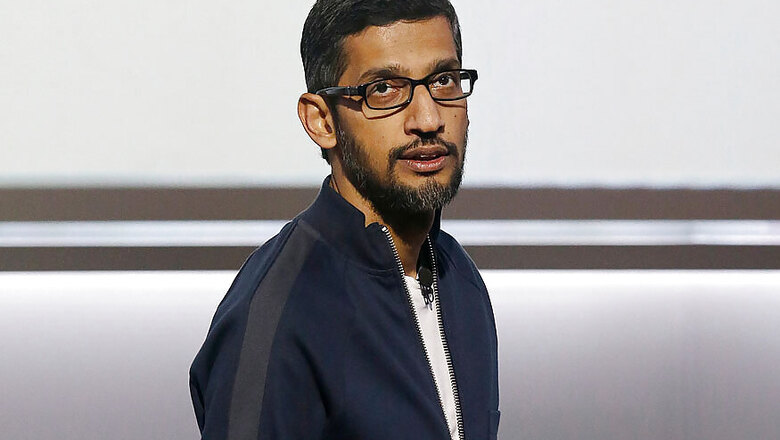
views
Washington: Citing a recent survey of undecided voters in India and the US, a top American lawmaker on Tuesday told Google's Indian-American CEO Sunder Pichai that a biased search rankings can shift the voting preferences of undecided voters by 20 per cent or more.
A study performed by psychologist Robert Epstein has revealed that internet search rankings have a significant impact on consumer choices mainly because users trust and choose higher ranked results more than lower ranked results, Congressman Robert Goodlatte, Chairman of the House Judiciary Committee, said.
Goodlatte and several other lawmakers posed questions to Google CEO Pichai in this regard during a hearing on transparency and accountability, examining Google and its data collection, use and filtering practices.
"After performing five relevant double-blind randomised controlled experiments using a total of 4,556 undecided voters representing diverse demographic characteristics of the voting populations of the United States and India, the study revealed that biased search rankings can shift the voting preferences of undecided voters by 20 per cent or more," Goodlatte said.
The shift can be much higher in some demographic groups and search ranking bias can be masked so that people show no awareness of the manipulation, he said.
Goodlatte said that the potential for this kind of bias is clearly problematic and is further compounded by the fact that Google every day collects mountains of information about its users while they are actively engaged with a Google product or even when they are not.
According to a study conducted by Vanderbilt University, a dormant stationary android phone, with Chrome active in the background, communicated location information to Google 340 times during a 24-hour period or had an average of 14 data communications per hour, he said.
Goodlatte said the collection of location data may be obvious to most users but they are often unaware of the many sensors that the Android platform supports including an accelerometer, a barometer, and a photometer.
"These sensors in addition to the cameras and microphones on a mobile device can collate into a very accurate picture of where a user is, what they are doing and who else is there," he said.
The shocking amount of information that Google collects at its phones was recently featured on Good Morning America in which a reporter using an android phone with no SIM card that wasn't connected to the internet discovered that the phone collected the device's movement even identifying the mode of transportation such as the subway or even a bicycle and at times taking 10 sensor readings per minute, he said.
The mere suspicion that Google manipulates its products for self-serving or even political purposes raises serious concerns about its business practices, its impact on free speech and our democratic process, Goodlatte said, adding that Americans trust that the information gathered about them in their day-to-day lives is done with their knowledge and is not being used against them.
In response, Pichai said that Google would be happy to look at the independent studies.
"It's important to us to demonstrate that our products work without any bias, and we build our products in a neutral way. And I'm happy to follow up and look forward to, you know, getting a chance to explain it better.
"I understand the frustration at seeing negative news, and I see it on me on Google. There are times you can search on Google, and page after page there's negative news, which we reflect, but what is important here is we use a robust methodology to reflect what is being said about any given topic at any particular time, and we try to do it objectively using a set of rubrics," he said.
"It is in our interest to make sure we reflect what's happening out there in the best objective manner possible. I can commit to you, and I can assure you, we do it without regards to political ideology," Pichai said.
It is not possible for an individual employee or groups to manipulate search results, he said, adding that the company has a robust framework including many steps in the process.
Google has taken several steps to protect against further interference by Russia or other hostile foreign powers, he said.
"We have undertaken a significant review of how ads are bought. You know, we look for the origin of these accounts. We share and collaborate with law enforcement, other technology companies, and we essentially are investing a lot of effort and oversight in this area," Pichai said.
Google, he said, has dramatically increased the protection it has around its election offerings.
"Leading up to the current elections, we again found limited activity, both from the Internet Research Agency in Russia, as well as accounts linked to Iran," he said.
Its own investigations revealed that in 2016, there were two main ad accounts linked to Russia, which advertised on Google for about USD 4,700 in advertising.
"Today, for any service we provide our users, we go to great lengths to protect their privacy and we give them transparency, choice and control. Android is a powerful platform and provides smartphones for over two billion people.
"And as part of that, it depends on the applications users choose to use. If you are using a fitness application, which is detecting the number of steps you walk, you expect it to send that information, but it's a choice users make. We make it clear and it depends on the use cases," Pichai added.




















Comments
0 comment